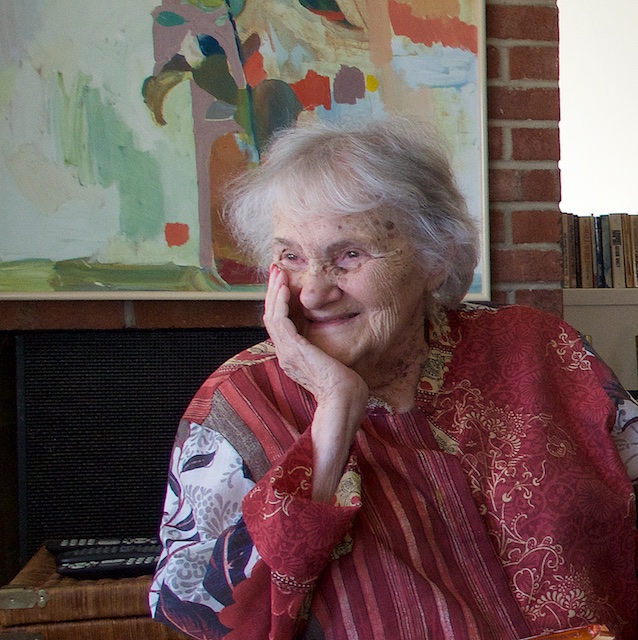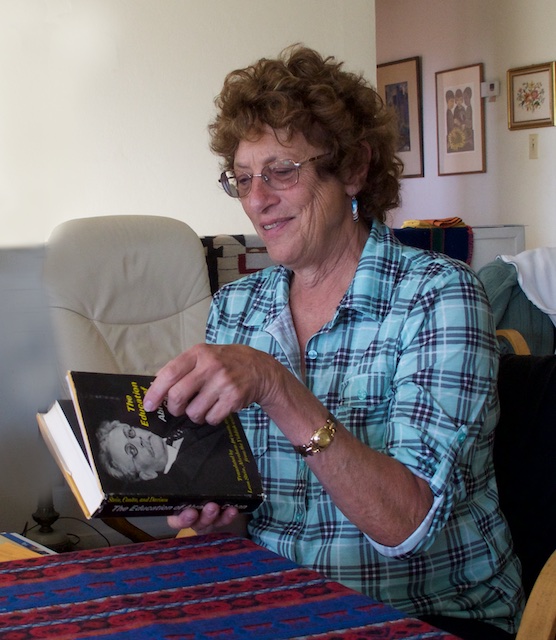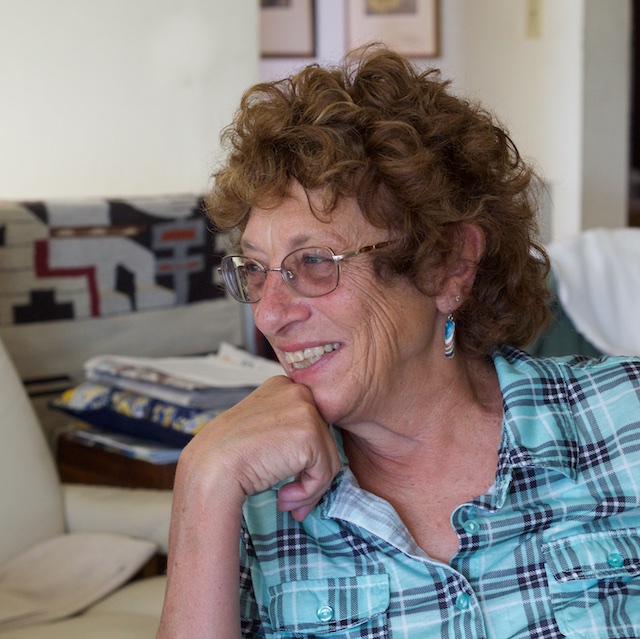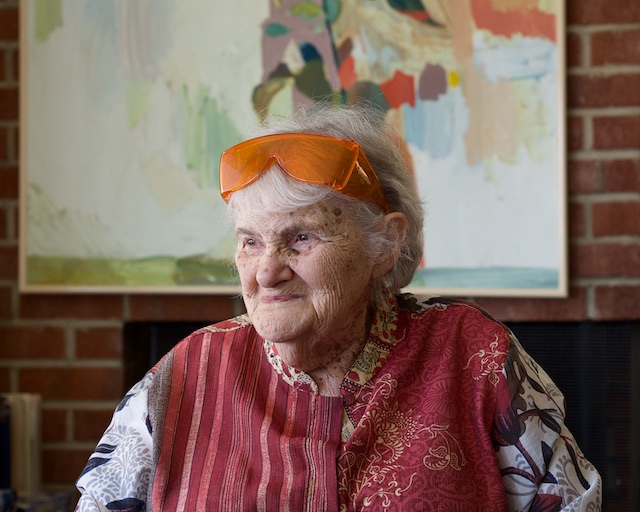Recognizing a “landsman”*
*Yiddish for a fellow villager
Writer Cynthia Bix
Photographer Nancy Rubin
In her light-filled living room, warmed by colorful pictures painted by a friend and a lifetime’s collection of books and artifacts, Ashby Village member Thelma Elkins sits down with volunteer Julie to talk about their history together. The two women seem as if they’ve known each for years, but surprisingly, it’s been just six months since they first met.
 The two have had a series of fruitful collaborations. For example, Thelma shares “I had a batch of letters written in Yiddish that were handed down to me. Some of them were written by my grandfather (back in Lithuania) to his son—the one who brought our family to this country—during the early part of the 20th century. There was also all this correspondence between cousins and other relatives. In the past I was able to read it all, but now I can’t see well enough.”
The two have had a series of fruitful collaborations. For example, Thelma shares “I had a batch of letters written in Yiddish that were handed down to me. Some of them were written by my grandfather (back in Lithuania) to his son—the one who brought our family to this country—during the early part of the 20th century. There was also all this correspondence between cousins and other relatives. In the past I was able to read it all, but now I can’t see well enough.”
As Thelma tells it, one of her granddaughters, then a high school student, “… called one day and said, ‘Grandma, I’m writing a senior paper, and I need a mentor. Will you be my mentor?’ So I said, sure. It turns out she wanted to write it on learning Yiddish, of which she knows not one word. But I’m the last repository of Yiddish; it was my first language growing up.”
Eager to help her granddaughter, Thelma tried without success to find someone to translate the Yiddish letters into English. Julie overheard Thelma talking on the phone seeking a Yiddish translator, and spoke up to say she might be able to help. Julie immediately sent out a couple of emails to a friend and a cousin who knew Yiddish.
 “Thelma and I both come from the same New York background,” explains Julie. “We’re both the children of Jewish immigrants. My parents spoke Yiddish when I was growing up.” And her father, a distinguished lawyer, had translated a book, The Education of Abraham Cahan, from Yiddish to English. Julie added, “Within a few days, we had several of the letters translated, and they were fascinating.”
“Thelma and I both come from the same New York background,” explains Julie. “We’re both the children of Jewish immigrants. My parents spoke Yiddish when I was growing up.” And her father, a distinguished lawyer, had translated a book, The Education of Abraham Cahan, from Yiddish to English. Julie added, “Within a few days, we had several of the letters translated, and they were fascinating.”
Abraham Cahan, the subject of the book Julie’s father translated, was the publisher of the influential Jewish Daily Forward in New York, and a leader in the New York Jewish community around the turn of the century. Julie’s father had even worked for that newspaper. (When Thelma found out about the book, she enthusiastically searched and bought a copy, even though she couldn’t see to read it.)
With the letters and other information Thelma provided, her granddaughter wrote her high school paper, and when she read it aloud to her class, it had quite an impact!
Thelma and Julie say it’s clear that the rapid blossoming of their friendship is because they have so many things in common, and they became immersed in them immediately. Thelma, who was a clinical social worker as well as owner of the former Easy Going (Berkeley’s beloved travel shop and bookstore), has always been an outgoing “people” person. And Julie, as a longtime (now retired) freelancer reporter for the Jewish Bulletin, Hills Publications, and many more newspapers, loves to talk to people and learn their stories. (With her longtime partner Rudi Raab, she is also the co-author of a recent novel, Stumbling Stone, based on their families’ histories.) And of course the two women’s background similarities are a big part of it all.
Thelma sums it up like this. “You don’t have to be told, you just know what ‘village’ your families come from—you’re a landsman [or lansman—roughly, Yiddish for a fellow villager]. There’s a familiarity, and from there, you’re off and running!”
First Meeting
Given the many interests Thelma and Julie now share, it was interesting to hear about the first time they met. Thelma asked for an Ashby Village volunteer to help her with only two things—to read her email, and to help her organize her papers.
 Volunteer Julie Freestone responded to the request. With years of experience as a freelance journalist (now retired), Julie had helped out Ashby Village members on two previous occasions. But this was her first visit to Thelma. She recalls, “I thought, these two requests seem to be combine-able, so I said okay, I’ll do it. I got here and said, okay, what do you want to do first?”
Volunteer Julie Freestone responded to the request. With years of experience as a freelance journalist (now retired), Julie had helped out Ashby Village members on two previous occasions. But this was her first visit to Thelma. She recalls, “I thought, these two requests seem to be combine-able, so I said okay, I’ll do it. I got here and said, okay, what do you want to do first?”
Thelma wanted to start with her email. Julie laughs, remembering. “Her email was like a little treasure trove. She had a brisket recipe for Passover, and information from the Jewish Bulletin of Northern California—which I used to work for as a reporter. There were emails about all kinds of political things, the same ones I also got at home, and lots of KQED stuff, and so forth. We found from doing that little exercise that we actually had a lot in common!”

After that first hour, Julie assumed they would turn to sorting papers. But Thelma said, “No—now that I know who you are, I have some much more pressing work for you to do.” As it happened, Thelma was about to make an important presentation to the Ashby Village Board the following week. In her typical dynamic style, she had responded to her loss of vision by starting a local support and information group for others with the same loss of vision. Now she wanted to take it a step further by making a presentation to the Ashby Village Board.
Julie takes up the tale. “She had six versions of this presentation, but of course she couldn’t see well enough to read them. Because I had told her I had been a reporter, she figured I could help. We both came from families where advocacy was the rule of the day, so this was a perfect match. So I decided to help her. I came back about three days later, and we finished the presentation.”
 Thelma explains how the group (whose ideas she planned to express to the Board) got started. “When I was first diagnosed with macular degeneration, I searched for resources and couldn’t find any. Macular degeneration is one of the fastest growing health problems for older people. People don’t know what it is, or where to go for help. So I and others formed the Ashby Village Macular Degeneration Support Group,” says Thelma. Note: macular degeneration affects more than 10 million Americans—more than cataracts and glaucoma combined. At present, it is considered an incurable eye disease.
Thelma explains how the group (whose ideas she planned to express to the Board) got started. “When I was first diagnosed with macular degeneration, I searched for resources and couldn’t find any. Macular degeneration is one of the fastest growing health problems for older people. People don’t know what it is, or where to go for help. So I and others formed the Ashby Village Macular Degeneration Support Group,” says Thelma. Note: macular degeneration affects more than 10 million Americans—more than cataracts and glaucoma combined. At present, it is considered an incurable eye disease.
“In addition to presenting basic information about macular degeneration and the experiences shared by members of my group,” says Thelma, “My pitch to Ashby Village was that since the organization was set up to take care of people in their homes, they should also become active in getting services to go with that, as part of their mission.”
The macular degeneration presentation was a great success. No surprise, Thelma was motivated to go on to try to influence wider circles of people. She is now personally active in getting support for legislation that affects people with low vision; an effort with which Julie assists.
From the very first meeting it was clear the two enjoyed a special relationship. When Julie called Thelma the next day to tell her how much she had enjoyed their meeting, Thelma told her, “I’ve been telling everybody I talked to today that an angel came to my house.”
And how does Julie experience the time she spends with Thelma? “I feel like I’m having a play date when I come over!” Julie says.